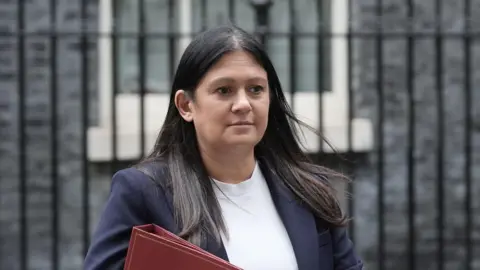 PA Media
PA MediaLisa Nandy has been found to have “unknowingly” breached public appointment rules with her choice to be the boss of England’s new football watchdog.
The culture secretary named sports rights executive David Kogan as the government’s preferred choice to run the new regulator in April.
But she later stood back from the process, after establishing that Mr Kogan had donated £2,900 to her 2020 Labour leadership campaign, according to a report.
Sir William Shawcross, the commissioner for public appointments, said Nandy should have checked beforehand and taken “any necessary consequential action”.
“The fact of the donations was capable of giving rise to a perceived conflict of interest in the appointment process,” Sir William added.
He added that Nandy was “in a position readily to ascertain whether he had donated to her campaign”, since she had been advised by officials of that Mr Kogan had “extensive links to the Labour Party and had made several donations to it”.
In a letter to Sir Keir Starmer, Nandy said she had declared Mr Kogan’s donations to her campaign “as soon as I discovered these donations existed”.
She added: I deeply regret this error. I appreciate the perception it could create, but it was not deliberate and I apologise for it”.
In a reply, the prime minister said he accepted that Nandy had “acted in good faith”.
But the Conservatives said the decision to appoint Mr Kogan without disclosing his previous donations represented a “serious breach of public trust”.
Shadow sport secretary Nigel Huddleston added: “This goes to the heart of Keir Starmer’s judgment.
“Both he and Lisa Nandy have very serious questions to answer”.
Labour donations
Sir William launched an inquiry in June, after Mr Kogan revealed during a confirmation hearing with MPs in May that he had contributed money to Nandy’s 2020 leadership campaign, as well as that of the prime minister.
His probe was into whether the appointment process breached the code that governs how people are appointed into public roles.
In his report, Sir William said Mr Kogan had made two donations of £1,450 each to Nandy’s 2020 campaign, one personally and one through his company.
They were part of total donations worth £33,410 to Labour and the party’s candidates in the five years prior to his appointment, the commissioner said.
The two donations to Nandy were below declaration thresholds set by the Electoral Commission and by Parliament.
But Sir William found that Nandy was “readily able to check” whether Mr Kogan had donated to her campaign before announcing him as her pick for chair, and should have done so prior to his appointment.
“It need not be true that the donations actually influenced the secretary of state’s decision-making – only that the risk of this perception should have been mitigated by declaration of this financial interest,” he wrote.
“The commissioner finds that she has unknowingly breached the code. She should have carried out that check and taken any necessary consequential action before selecting him,” he added.
‘Learn lessons’
The commissioner also found Nandy’s department breached the appointment rules by failing to declare Mr Kogan’s previous donations to Labour when he was announced as the government’s preferred choice for the role in April.
The department also breached the rules by not discussing his donations when he was interviewed for the job, Sir William found.
In his letter to Nandy, Sir Keir admitted that “the process followed was not entirely up to the standard expected”.
He added that Nandy’s department had said it was willing to co-operate with the commissioner, as well as the Cabinet Office, to “learn lessons and to improve the guidance on handling conflicts of interest”.
It was confirmed last month that Mr Kogan has been appointed for a five-year term running the new regulator until May 2030.
The watchdog will be responsible for overseeing the men’s game in England’s top five divisions.
In a statement, Mr Kogan said: “I have cooperated fully throughout the investigation and can now draw a line under the process.
“As the commissioner states, my suitability for the role has never been in question, and at no point was I aware of any deviation from best practice.
“It is now time to move on and get on with the business of setting up the IFR [Independent Football Regulator] so we can tackle the critical and urgent issues facing football.”

